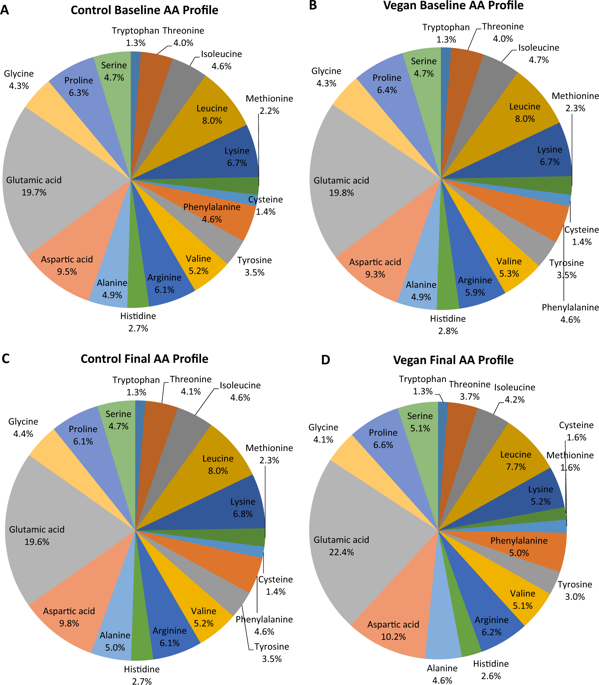Nutrition & Diabetes ( IF 4.6 ) Pub Date : 2018-11-02 , DOI: 10.1038/s41387-018-0067-4 Hana Kahleova , Rebecca Fleeman , Adela Hlozkova , Richard Holubkov , Neal D. Barnard

|
Background and objectives
A plant-based diet is an effective strategy in the treatment of obesity. In this 16-week randomized clinical trial, we tested the effect of a plant-based diet on body composition and insulin resistance. As a part of this trial, we investigated the role of plant protein on these outcomes.
Subjects and methods
Overweight participants (n = 75) were randomized to follow a plant-based (n = 38) or a control diet (n = 37). Dual X-ray Absorptiometry assessed body composition, Homeostasis Model Assessment (HOMA-IR) assessed insulin resistance, and a linear regression model was used to test the relationship between protein intake, body composition, and insulin resistance.
Results
The plant-based vegan diet proved to be superior to the control diet in improving body weight, fat mass, and insulin resistance markers. Only the vegan group showed significant reductions in body weight (treatment effect −6.5 [95% CI −8.9 to −4.1] kg; Gxt, p < 0.001), fat mass (treatment effect −4.3 [95% CI −5.4 to −3.2] kg; Gxt, p < 0.001), and HOMA-IR (treatment effect −1.0 [95% CI −1.2 to −0.8]; Gxt, p = 0.004). The decrease in fat mass was associated with an increased intake of plant protein and decreased intake of animal protein (r = -0.30, p = 0.011; and r = +0.39, p = 0.001, respectively). In particular, decreased % leucine intake was associated with a decrease in fat mass (r = +0.40; p < 0.001), in both unadjusted and adjusted models for changes in BMI and energy intake. In addition, decreased % histidine intake was associated with a decrease in insulin resistance (r = +0.38; p = 0.003), also independent of changes in BMI and energy intake.
Conclusions
These findings provide evidence that plant protein, as a part of a plant-based diet, and the resulting limitation of leucine and histidine intake are associated with improvements in body composition and reductions in both body weight and insulin resistance.
中文翻译:

在一项为期16周的随机临床试验中,针对超重个体的植物性饮食:植物蛋白的代谢益处
背景和目标
植物性饮食是治疗肥胖的有效策略。在这项为期16周的随机临床试验中,我们测试了植物性饮食对人体成分和胰岛素抵抗的影响。作为该试验的一部分,我们研究了植物蛋白在这些结果中的作用。
主题与方法
超重参与者(n = 75)被随机分配以植物为基础(n = 38)或对照饮食(n = 37)。双X线吸收法评估人体成分,稳态模型评估(HOMA-IR)评估胰岛素抵抗,并使用线性回归模型测试蛋白质摄入,身体成分和胰岛素抵抗之间的关系。
结果
事实证明,以植物为基础的纯素饮食在改善体重,脂肪量和胰岛素抵抗指标方面优于对照饮食。仅纯素食主义者组的体重显着降低(治疗效果为-6.5 [95%CI -8.9至-4.1] kg; Gxt,p <0.001),脂肪量(治疗效果为-4.3 [95%CI -5.4至-3.2] ] kg; Gxt,p <0.001)和HOMA-IR(治疗效果-1.0 [95%CI -1.2至-0.8]; Gxt,p = 0.004)。脂肪量的减少与植物蛋白的摄入增加和动物蛋白的摄入减少有关(r = -0.30,p = 0.011;r = + 0.39,p 分别为0.001)。特别是, 在BMI和能量摄入变化的未调整模型和调整模型中,亮氨酸摄入百分比的降低与脂肪量的减少相关(r = +0.40;p <0.001)。此外,组氨酸摄入量减少与胰岛素抵抗的降低相关(r = +0.38;p = 0.003),也与BMI和能量摄入的变化无关。
结论
这些发现提供了证据,即作为基于植物的饮食的一部分的植物蛋白,以及由此导致的亮氨酸和组氨酸摄入量的限制与人体成分的改善以及体重和胰岛素抵抗力的降低有关。











































 京公网安备 11010802027423号
京公网安备 11010802027423号